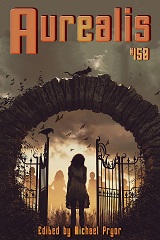Aurealis #150, May 2022
#150, May 2022
“The Thrill” by JP Townsend
“Remembrance in Skin” by Alastair Brown
“The Wormtail Invasion” by Karl El-Koura
Reviewed by Victoria Silverwolf
In addition to three new works of fiction, this issue offers articles and reviews, with subjects ranging from a novel of the Nineteenth Century to a new television series.
In “The Thrill” by JP Townsend, the world has been invaded by fungus-like humanoid beings, who produce music that controls the minds of human victims. The protagonist and fellow soldiers wander through the tunnels that contain the old, conquered cities, destroying these creatures and trying to avoid the music. The protagonist makes a discovery on one such mission, which leads to great changes.
This brief and oversimplified synopsis is misleading, because much of the story deals with the protagonist’s psychology and relationship with a nightclub entertainer. The author’s afterword makes it clear that many aspects of this work are intended as symbols for the fluidity of gender and sexuality. Besides the obvious fact that the protagonist is nonbinary, it is difficult to unravel the meaning behind these metaphors. Considered just as speculative fiction concepts, they are intriguing, if overly mysterious.
The narrator of “Remembrance in Skin” by Alastair Brown undergoes a strange ritual at the age of ten. The child’s father teaches his offspring to write phrases from a book. These cause excruciating pain in the youngster. The intent is to teach the child that writing has great power that must not be used. In defiance of authority, the narrator chooses to endure the pain in order to use writing to change reality.
As can be seen, this story is an allegory for the importance of the written word. There’s always a risk when writers write about writing; the resulting work can seem self-obsessed and self-aggrandizing. Looking at the tale’s plot logic, it’s hard to understand why children are told about their immense power to alter the world, but then instructed not to use it, with pain as reinforcement for the lesson. Surely someone would expect a brave child, like the narrator, to overcome the agony and make use of this power.
In “The Wormtail Invasion” by Karl El-Koura, aliens arrive on Earth and offer a substance that will cure all illnesses, in exchange for gold. This is a very mixed blessing, as the medication makes it impossible for women who use it to bear children, and it causes all those who use it to die after about thirty years of perfect health. Given the fact that not all nations accept the aliens’ offer, there are also fewer doses of the substance than the number of people on the planet, leading to chaos and the collapse of civilization. Nearly fifty years later, the aliens return, and their motives become clear.
The story is told from the point of view of the son of a man who suspected the aliens from the start. Much of the narrative deals with his battle against the extraterrestrials, along with others inspired by his father. This part of the plot seems like something out of a Hollywood action movie rather than modern written science fiction. The fact that the aliens want gold also seems old-fashioned, and rather silly.
Victoria Silverwolf notes that this issue also contains a discussion of the career of award-winning author Anne McCaffrey.